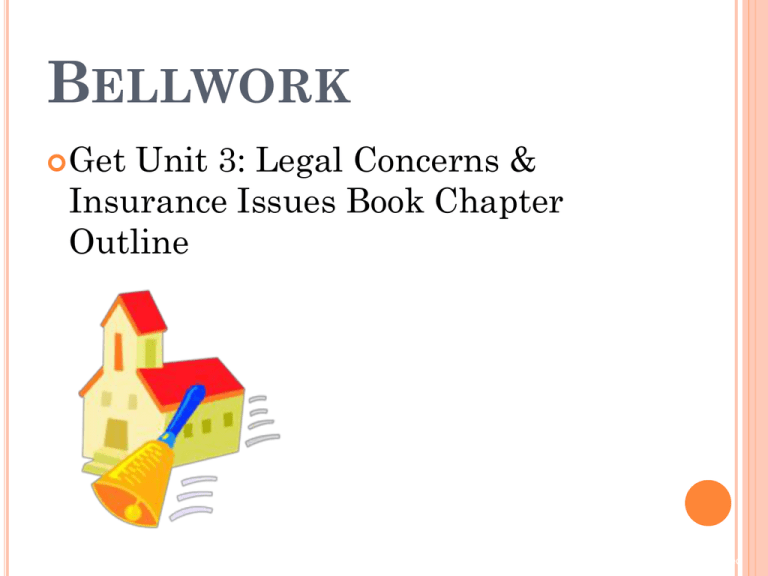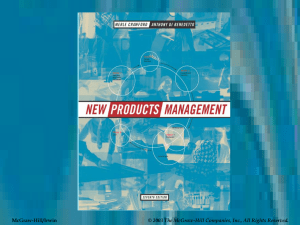
BELLWORK
Get
Unit 3: Legal Concerns &
Insurance Issues Book Chapter
Outline
© 2011 McGraw-Hill Higher Education. All rights reserved
Categorize
the essential insurance
requirements for the protection of the patient
The state of being legally responsible for the
harm one causes another person
Legal wrongs committed against a person
Provides limited protection against legal
liability to any individual who voluntarily
chooses to provide first aid
Torts
Nonfeasance
Malfeasance
Misfeasance
© 2011 McGraw-Hill Higher Education. All rights reserved
HMO,
PPO, POS, EPO, PHO, TPA, Medicare,
Medicade, Workers Compensation, Indemnity
Plan, Capitation
A provision in an insurance policy requiring
the policyholder to pay a specific percentage of
each medical claim
The amount owed by the insured on a yearly
basis before the insurance company will begin
to pay for services rendered
A periodic payment made to an insurance
company by an individual policy
Description of Billing Codes used by Athletic
Trainers
© 2011 McGraw-Hill Higher Education. All rights reserved
OBJECTIVE
Topic:
Legal Concerns &
Insurance Issues
Do: Describe parts of negligence
& Create a scenario on
negligence
L.O.T: Creating
© 2011 McGraw-Hill Higher Education. All rights reserved
CHAPTER 3: LEGAL CONCERNS
AND INSURANCE ISSUES
© 2011 McGraw-Hill Higher Education. All rights reserved
LEGAL CONCERNS FOR
THE ATHLETIC TRAINER
Lawsuits
have become the rule
rather than the exception
Athletic trainers are held
accountable for their patient
care
What
they do and don’t do
© 2011 McGraw-Hill Higher Education. All rights reserved
NEW VOCAB WORD
Receive
a new unit vocabulary
sheet
© 2011 McGraw-Hill Higher Education. All rights reserved
LIABILITY
Definition
The
state of being legally
responsible for the harm one
causes another person
© 2011 McGraw-Hill Higher Education. All rights reserved
LIABILITY
Uses/
Elaboration:
Athletic
Trainers are liable for
their actions- can be sued
© 2011 McGraw-Hill Higher Education. All rights reserved
LIABILITY
© 2011 McGraw-Hill Higher Education. All rights reserved
NEGLIGENCE
Definition
The failure to use ordinary or
reasonable care
© 2011 McGraw-Hill Higher Education. All rights reserved
NEGLIGENCE
Uses/
Elaboration:
Care that persons would normally do
to avoid injury to themselves or others
Commonsense approach to the
situation
Operate within limits of educational
background/ license
© 2011 McGraw-Hill Higher Education. All rights reserved
NEGLIGENCE
© 2011 McGraw-Hill Higher Education. All rights reserved
DUTY OF CARE
Definition
Part of the official job
description
© 2011 McGraw-Hill Higher Education. All rights reserved
DUTY OF CARE
Uses/
Elaboration:
What the person is suppose to
do
© 2011 McGraw-Hill Higher Education. All rights reserved
DUTY OF CARE
© 2011 McGraw-Hill Higher Education. All rights reserved
TO PROVE NEGLIGENCE
Duty
to Care
Breach of duty (Conduct
fell short)
Damages (Injury/ $)
© 2011 McGraw-Hill Higher Education. All rights reserved
THINK, PAIR, SHARE
Think
of a person/ entity in sports
(coach, athletic director, ATC, team
doctor, school) and create a scenario
on how they could get sued for
negligence
Need to show:
Duty to Care
Breach of Duty
Damages
© 2011 McGraw-Hill Higher Education. All rights reserved
BELLWORK
What
are the 3 things one must
prove in order to successfully sue
for negligence?
Duty to Care
Beach of Duty
Damages
© 2011 McGraw-Hill Higher Education. All rights reserved
OBJECTIVE
Topic:
Torts (Legal Wrongs) &
Legal Protection
Do: Examine & Analyze if there
is a Tort
L.O.T.: Analyzing
© 2011 McGraw-Hill Higher Education. All rights reserved
NEW VOCAB WORD
Get out your vocab sheet
© 2011 McGraw-Hill Higher Education. All rights reserved
TORTS
Definition:
Legal
wrongs committed
against a person or property of
another
© 2011 McGraw-Hill Higher Education. All rights reserved
TORTS
Uses/
Elaborations:
Doing
something wrong
intentionally or by negligence
Torts serve as a deterrent as
stating what is acceptable
© 2011 McGraw-Hill Higher Education. All rights reserved
TORTS
© 2011 McGraw-Hill Higher Education. All rights reserved
NONFEASANCE
Definition:
When an individual fails to perform a
legal duty
© 2011 McGraw-Hill Higher Education. All rights reserved
NONFEASANCE
Uses/
Elaboration:
Also known act of omission
They do not do something they are
suppose to do
© 2011 McGraw-Hill Higher Education. All rights reserved
NONFEASANCE
© 2011 McGraw-Hill Higher Education. All rights reserved
MALFEASANCE
Definition:
An
individual commits an act
that is not legally his to
perform
© 2011 McGraw-Hill Higher Education. All rights reserved
MALFEASANCE
Uses/
Elaboration:
Act
of commission
Doing something outside of their
duty
© 2011 McGraw-Hill Higher Education. All rights reserved
MALFEASANCE
© 2011 McGraw-Hill Higher Education. All rights reserved
MISFEASANCE
Definition:
An individual improperly does
something he or she has the legal
right to do
© 2011 McGraw-Hill Higher Education. All rights reserved
MISFEASANCE
Uses/
Elaboration
Does something wrong they have the
legal right to do and there are damages
© 2011 McGraw-Hill Higher Education. All rights reserved
MISFEASANCE
© 2011 McGraw-Hill Higher Education. All rights reserved
PROVING NEGLIGENCE
Negligence
suit to be successful
Prove the athletic trainer had a
duty to exercise reasonable care
The athletic trainer breached that
duty
Connection between the failure to
use reasonable care and the injury
© 2011 McGraw-Hill Higher Education. All rights reserved
OTHER LEGAL ASPECTS
Individual
with higher level of training
will possess higher level of competence
Doctor vs. Athletic Trainer vs. Coach
Once
an individual assumes duty of
care for athlete that person has an
obligation to provide appropriate care
© 2011 McGraw-Hill Higher Education. All rights reserved
LEGAL PROTECTION*
NEW VOCAB
Sovereign
Immunity
Good Samaritan Law
© 2011 McGraw-Hill Higher Education. All rights reserved
NEW VOCAB WORD
Get out your vocab sheet
© 2011 McGraw-Hill Higher Education. All rights reserved
SOVEREIGN IMMUNITY
Definition:
Neither the government nor any
individual who is employed by the
government can be held liable for
negligence
© 2011 McGraw-Hill Higher Education. All rights reserved
SOVEREIGN IMMUNITY
Uses/
Elaboration:
Employed by a public school or state
funded college/ university
Varies from state to state
© 2011 McGraw-Hill Higher Education. All rights reserved
SOVEREIGN IMMUNITY
© 2011 McGraw-Hill Higher Education. All rights reserved
GOOD SAMARITAN LAW
Definition:
Provides
limited protection
against legal liability to any
person who voluntarily chooses
to provide first aid
© 2011 McGraw-Hill Higher Education. All rights reserved
GOOD SAMARITAN LAW
Uses/
Elaboration:
Acts
within their education and
gives reasonable care
© 2011 McGraw-Hill Higher Education. All rights reserved
GOOD SAMARITAN LAW
© 2011 McGraw-Hill Higher Education. All rights reserved
SCENARIO- BASEBALL LAWSUIT
Receive
Baseball Lawsuit
Scenario
Answer Yes, No & Why
© 2011 McGraw-Hill Higher Education. All rights reserved
BELLWORK
Define
in your own words:
Nonfeasance
Malfeasance
Misfeasance
© 2011 McGraw-Hill Higher Education. All rights reserved
OBJECTIVE
Topic:
Legal Protection & Case
Studies
Do: Evaluate, Assess & Discuss
Various Case Studies
L.O.T.: Evaluating
© 2011 McGraw-Hill Higher Education. All rights reserved
STATUTES OF LIMITATION
Length
of time an individual can sue
for negligence
Varies by state (usually 1-3 years)
Time the negligent act to the lawsuit or
from the time injury is discovered
following negligent act
Minors have generally have an extension
© 2011 McGraw-Hill Higher Education. All rights reserved
NEW VOCAB WORD
Get out your vocab sheet
© 2011 McGraw-Hill Higher Education. All rights reserved
ASSUMPTION OF RISK
Definition:
The
individual, through
express or implied agreement,
assumes that some risk or
danger will be involved in the
particular undertaking.
© 2011 McGraw-Hill Higher Education. All rights reserved
ASSUMPTION OF RISK
Uses/
Elaboration:
A
person takes his/ her own
chances
© 2011 McGraw-Hill Higher Education. All rights reserved
ASSUMPTION OF RISK
© 2011 McGraw-Hill Higher Education. All rights reserved
PRODUCT LIABILITY
Liability
of any or all parties involved in
manufactured product
Includes manufacturer of components,
assemblers, wholesaler, and retail store
owner
Athletic trainers, coaches, etc. should not alter
equipment
Invalidates the manufacturers warranty
Liability solely on the athletic trainer, coach,
etc.
© 2011 McGraw-Hill Higher Education. All rights reserved
Equipment
warning labels
Informs of possible dangers with product
use
National Operating Committee on
Standards for Athletic Equipment
(NOCSAE)
Minimum standards for equipment to
ensure safety
© 2011 McGraw-Hill Higher Education. All rights reserved
CASE STUDY- GROUP WORK
Students
divided into small groups
Each group will be given a law case
study
Groups will answer the worksheet
Each group will give a short
presentation on what the case was
and answers to the worksheet
© 2011 McGraw-Hill Higher Education. All rights reserved
BELLWORK
How
much do you think an ACL
surgery cost?
$35,000
Cost
of ER Visit for broken arm (no
surgery)?
$2,500
Cost
of ER visit for scalp stitches?
$1,869
© 2011 McGraw-Hill Higher Education. All rights reserved
OBJECTIVE
Topic:
Insurance
Considerations
Do: Identify General Health
Care & Insurance
L.O.T.: Remembering
© 2011 McGraw-Hill Higher Education. All rights reserved
INSURANCE
CONSIDERATIONS
Managed
Care:
Health care cost is monitored by
insurance carriers, often needing
preapproval
Medical Insurance:
Contract between insurance company
and policyholder
Insurance company reimburses part of
the medical bill once deductible is
meant
© 2011 McGraw-Hill Higher Education. All rights reserved
GENERAL HEALTH INSURANCE
Every
person should have
Covers illness, hospitalization and
emergency care
For schools and institutions:
Primary Insurance- Covers all medical
expenses
Secondary Insurance- Pays remaining
bills once personal insurance company
pays
Family Health Insurance:
Personal insurance
© 2011 McGraw-Hill Higher Education. All rights reserved
ACCIDENT INSURANCE
Low
cost plan to cover accident on
school grounds or in workplace
Cover costs associated with hospital
care, surgery, and catastrophic
injuries not covered by general
insurance
Does not require fault
Amount of pay is limited
© 2011 McGraw-Hill Higher Education. All rights reserved
PROFESSIONAL LIABILITY
INSURANCE
Covers
claims of
negligence on the part of
the individual
Covers negligence on a
civil case not criminal
© 2011 McGraw-Hill Higher Education. All rights reserved
CATASTROPHIC INSURANCE
Catastrophic
injuries in athletics
are relatively rare, but are
staggering
Organizations (NCAA, NAIA,
NFSHSA) provide additional
coverage to deal with lifetime
extensive care
© 2011 McGraw-Hill Higher Education. All rights reserved
INSURANCE VIDEO
Handout
video questions
Watch and answer
questions
Will go over after video
© 2011 McGraw-Hill Higher Education. All rights reserved
INSURANCE VIDEO
http://www.khanacademy.org/science/healthcareand-medicine/v/healthcare-system-overview
© 2011 McGraw-Hill Higher Education. All rights reserved
INSURANCE VIDEO ANSWERS
Providers
Insurers
Employers
& Patients
HMO
PPO
© 2011 McGraw-Hill Higher Education. All rights reserved
BELLWORK
In
12 words or less why do you
think an athlete should have
general insurance?
© 2011 McGraw-Hill Higher Education. All rights reserved
OBJECTIVE
Topic:
Third Party
Reimbursement & Billing
Do: Classify and Evaluate
Different Insurances
L.O.T.: Evaluating
© 2011 McGraw-Hill Higher Education. All rights reserved
THIRD- PARTY
REIMBURSEMENT
Primary
mechanism of payment for
medical services in the U.S.
Insurance company reimburses
health care providers for services
rendered
Number of different options but most
are pre-arranged systems
Preventative care
© 2011 McGraw-Hill Higher Education. All rights reserved
HEALTH MAINTENANCE ORGANIZATION
(HMO)
Provide
preventive measures
and dictate where individual can
receive care
Permission must be gained to
see someone outside of the plan
(except in emergencies)
Pays 100% of cost if go to HMO
facility
© 2011 McGraw-Hill Higher Education. All rights reserved
PREFERRED PROVIDERS ORGANIZATION
(PPO)
Limits
to a degree where
treatment is obtained
May include additional coverage
easier (physical therapy)
PPO pay on a fee-for-service
basis
© 2011 McGraw-Hill Higher Education. All rights reserved
POINT OF SERVICE
Combination
of HMO and PPO
Based on HMO model but allows
for care outside of the plan
Flexibility is allowed for certain
conditions and circumstances
© 2011 McGraw-Hill Higher Education. All rights reserved
OTHER
Exclusive
Provider Organization
Combo of HMO and PPO but very
restrictive
Physician Hospital Organization
(PHO)
Contracts with hospital chain
Third- Party Administrators (TPA)
Pay claims for self-insured group
plans, administration service
© 2011 McGraw-Hill Higher Education. All rights reserved
MEDICARE & MEDICAID
Medicare:
Federal
Health Insurance for
the aged & disabled
Medicaid:
People with low incomes or
limited resources
Combination of federal and
state
© 2011 McGraw-Hill Higher Education. All rights reserved
INSURANCE BILLING & FILING A
CLAIM
Must
file claims immediately and
correctly
Filling a claim
Must have a 5 digit diagnostic code
(the condition or the injury)
Current Procedure Terminology
(CPT code)- specific medical
procedures
© 2011 McGraw-Hill Higher Education. All rights reserved
DESCRIPTION OF BILLING CODES USED BY
ATHLETIC TRAINERS
CPT Codes (Current Procedure Terminology Codes)
97005/97006
97116
Athletic trainer evaluation and
reevaluation (per visit)
Physical performance test (each 15
minutes) treatment charges
Gait training (each 15 minutes)
97110
Therapeutic exercise (each 15 minutes)
97112
Neuromuscular reeducation (each 15
minutes)
Therapeutic activities (each 15 minutes)
97750
97530
97113
97124
97530
97140
Aquatic therapeutic exercise (each 15
minutes)
Massage (each 15 minutes)
Body mechanics training (each 15
minutes)
Manual therapy (each 15 minutes)
© 2011 McGraw-Hill Higher Education. All rights reserved
ASSIGNMENT: INSURANCE
SCENARIO
Get
Scenario Handout
Answer questions (Yes, No &
Why)
Discuss
© 2011 McGraw-Hill Higher Education. All rights reserved
PLAN
Get
Unit 3 Worksheet
Review for Unit 1, 2 & 3 Test
next class period
Unit 1-3 Test day after
© 2011 McGraw-Hill Higher Education. All rights reserved





